
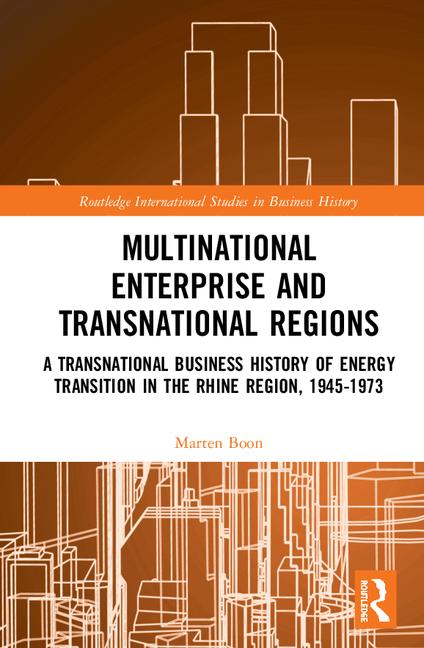 Multinational Enterprise and Transnational Regions: A Transnational Business History of Energy Transition in the Rhine Region, 1945-1973
Multinational Enterprise and Transnational Regions: A Transnational Business History of Energy Transition in the Rhine Region, 1945-1973
By Marten Boon
Publisher: Routledge
Recommended by Nicholas Ostrum
Marten Boon’s Multinational Enterprise and Transnational Regions: A Transnational Business History of Energy Transition in the Rhine Region, 1945-1973 offers a compelling study of the Rhine valley as an eminently transnational region that has played a critical role in European economic expansion and connectivity. The book’s primary focus is petroleum and the clusters of chemical and industrial plants infrastructurally and economically linked to the pipelines and ports that transported it. Pressured by national, supra-national, and multinational corporate interests pursuing contending priorities of “energy security, local economic development, port competition, business interests and strategies, Cold War politics and industrial policies,” Boon shows that the development of the Rhine as a major oil route was central to the Western European energy transition from domestic coal to foreign hydrocarbons. Even with the disruptions that this turn to oil produced, it nevertheless “fueled a more even distribution of economic activity in the Rhine valley and its hinterlands, transforming the region’s economic geography” through reconfiguring and deepening connections between the industrial clusters along the Rhine and ports at Wilhelmshaven and, more prominently, Rotterdam. This book will appeal to a range of readers interested in business, economic, and energy history, as well as those who wish to better understand the nuances and tensions of postwar Europe’s infrastructural integration.
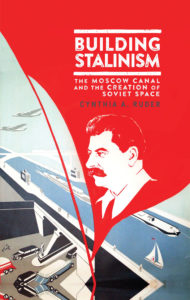 Building Stalinism: The Moscow Canal and the Creation of Soviet Space
Building Stalinism: The Moscow Canal and the Creation of Soviet Space
by Cynthia A. Ruder
Publisher: Ibtauris
Recommended by Samantha Lomb
In this work, Cynthia Ruder explores how the building of the Moscow canal reflected the values of Stalinism and how it was used to create distinctly Soviet space, both real and imagined. She discusses the canal as a physical construct: a massive and important infrastructure project that would allow Moscow to have a steady supply of drinking water and create enough water pressure to allow for the construction of high rises, as well as a shipping channel that connected Moscow to the Volga and the Russian heartland and the rest of the world via the Baltic, White and Caspian seas. Ruder also explores the Stalinist political system’s ability to tame and control water, bending it in service of socialism, which was memorialized in the reimagining of spaces and expressed in art, film and literature. Ruder also explores the darker side of canal construction, the use of Gulag labor, and how this too was reflective of a Stalinist world-view. Building Stalinism provides an excellent look into the pervasive nature of Stalinism and its complex modern legacy.
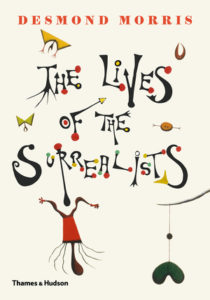
The Lives of the Surrealists
By Desmond Morris
Publisher: Thames & Hudson
Recommended by Louie Dean Valencia-García
Desmond Morris, a member of the Surrealist movement in the 1940s, an exhibitor of paintings and drawings by chimpanzees in the late 1950s, who later earned his PhD in zoology, has written a book filled with thirty-two biographies of members, affiliates, practitioners, and exiles of the Surrealist movement as only a bonafide member can. The nonagenarian writes, “An oddity of this book is that it makes little attempt to analyze or discuss in detail the actual paintings or sculptures made by the surrealists. I will leave that to the critics and art historians.” Morris, whose first surrealist exhibition was with Joan Miró, delves into past stereotypical images to describe the ways that Surrealist philosophy and libertine lifestyles influenced the work done by the tumultuous group. Most collected biographies of this nature often fail to capture the personalities and wit of the artists. Morris’ work is brilliant in its caustic portraitures of artists familiar and less-known. Of André Breton, Morris writes, “André Breton was the most central, most important figure in the history of surrealism…Nobody played a more significant role in organizing and promoting the surrealist movement and for that he must always be respected…Having established that, it must be said that he was a pompous bore, a ruthless dictator, a confirmed sexist, an extreme homophobe and a devious hypocrite.” Morris has written a work that not only gives fascinating insights to a well-trodden subject but does so with authority and humor—a rare gift.
The book does well to give ample attention to the likes of Salvador Dalí, Max Ernst, René Magritte, Joan Miró, and Pablo Picasso. Where Morris’ book really shines, however, is its intention to describe the world of transgressive women and queer people that formed an integral part of the Surrealist movement—artists who often received the ire of Breton. The lives of Eileen Agar, Francis Bacon, Leonora Carrington, Leonor Fini, Dorothea Tanning, and Meret Oppenheim often prove even more captivating than the stars of the movement. In the background of each of these stories, the reader finds stories of Weimar Berlin, Paris of the 1920s, and scenarios in and between both World Wars. The story of the Surrealists is interrupted with the outbreak of the Second World War, tossing members of the group across the globe. Morris demonstrates through these biographies just how much danger many Surrealists found themselves in with the rise of Nazi Germany—Jews, queer people, and people of color, such as Wifredo Lam, who had to make a quick exit from Europe. The movement would never fully recover from this global diaspora. An excellent read, this biography of the Surrealists is sure to be of interest to the expert and the novice.
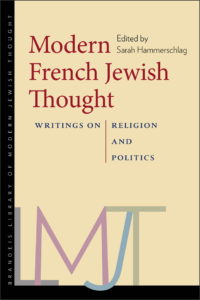
Modern French Jewish Thought. Writings on Religion and Politics
By Sarah Hammerschlag, editor
Publisher: Brandeis University Press
Recommended by Thomas Nolden
Sarah Hammerschlag has put together a long overdue volume that presents the key texts penned by Jewish intellectuals on Jewish identity in modern France. To be sure, research on the historical experience of Jews in France as well on their many intellectual contributions to the debates of modernity abound, but never before was it possible to find English translations of the main essays collected in one volume. Hammerschlag organizes her vademecum mostly chronologically, thus setting out with the debates around the Dreyfus affaire by thinkers still impacted by the German Wissenschaft des Judentums. A second part reconstructs the reactions of Jewish thinkers to the catastrophe of World War II and includes the canonical texts by Simone Weil, Emmanuel Lévinas and Vladimir Jankélévitch, but also essays penned by less well-known intellectuals. Memmi, Marienstras and Neher are among the critics whose ideas Hammerschlag presents in her chapter entitled “Universal and Particular: The Jew and the Political Realm” whereas the last chapter (“Identifications and Disidentifications”) moves on to the generation of Finkielkraut, Cixoux and Derrida. Reactions to Sartre’s provoking Reflections on the Jewish Question from 1946 do not dominate the second half of the volume, thus adjusting the valence of Sartre’s intervention retroactively, as it were. Contributions made available in earlier publications (e.g. in the famed 1999 issue of Octobe) thus cede space to articles that had not yet been widely available in English. More importantly, Hammerschlag thus succeeds in creating a panorama of French Jewish thought no longer overly pre-occupied by rectifying misconceptions of Jewish identity made by non-Jews. Hammerschlag’s introduction is a beautiful piece of scholarship which looks at the historical discourse from the vantage point of theoretical attempts at making sense of a diasporic experience which indeed sheds light not only on the precarious situation of Jews in France’s history but also, by an extension offered in many a reflection presented in the volume) on the predicaments of minorities in contemporary Europe in general.
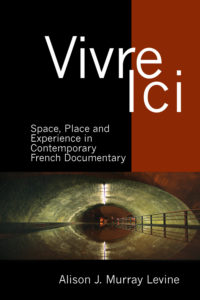
Vivre ici: Space, Place, and Experience in Contemporary French Documentary
By Alison J. Murray Levine
Publisher: Liverpool University Press
Recommended by Hélène B. Ducros
In this book, Alison Murray Levine engages with France’s rich creative “documentary ecosystem” by focusing on films produced in the last two decades to explain how documentary filmic esthetics, production and reception dynamically interlace within a particular context and discourse and through a slew of actors, which are often positioned outside the market. She puts various documentaries in conversation to articulate a spatial theory of filmic experience through phenomenological concepts such as “the feeling of being there”, active viewership and embodied spectatorship, as well as haptic perception, which involves the eye as an instrument of tactile sensation. Inspired by the notion of direct cinema, in which not only filmmakers but also spectators are involved as active viewers who co-produce meaning, she demonstrates how cinema worlds emanate from the relationship between filmmakers, the subjects being filmed and the viewers, thus creating a specific space where these roles are no longer fixed. Instead, all participate in flows that create “documentary consciousness” and elicit spatial dynamics through awareness of kinesthetic space. As she envisages documentaries as shared spaces, she invites viewers to feel close to filmed subjects while at the same time engaging in critical spectatorship. This process involves mind and body, resulting from multisensory experiences that implicate a spectrum of emotional and bodily senses beyond vision.
To highlight various forms of filmic interventions, Murray Levine chooses a few place-based themes at different scales, from the planet to the farm or the school. These apparently mundane spaces in which human and non-human actors construct and share filmic experiences lead to a meaningful reflection on ideas such as the nation, the environment, territory, the local and the rural, but also on failed place-making and exclusion, in the end revealing of contemporary anxieties about the inadequacy of the state at creating inclusive spaces for all. In showing that “documentaries matter” in the contemporary media landscape, her interdisciplinary experiential approach to filmic space will compel scholars from an array of fields to pay attention to creative documentaries as an important method for addressing historical and societal processes.
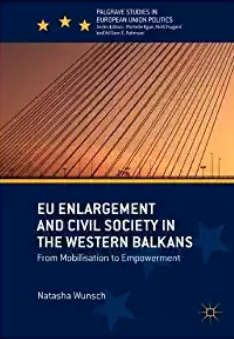 EU Enlargement and Civil Society in the Western Balkans: From Mobilisation to Empowerment
EU Enlargement and Civil Society in the Western Balkans: From Mobilisation to Empowerment
By Natasha Wunsch
Publisher: Palgrave
Recommended by Daniela Irrera
While the European Union is currently committed to identifying a common solution to cope with migrants and refugees, other countries remain at its door, waiting to be admitted. Western Balkans have always been a European priority and the process of stabilization and preparation to enlargement continues. In her book, Natasha Wunsch offers an interesting contribution to this debate, by stressing the role of civil society and local stakeholders in mobilizing bottom-up practices and influencing the negotiations. In so doing, she provides an original perspective, necessary to explain how the Europeanization process is induced also by non-governmental actors.




